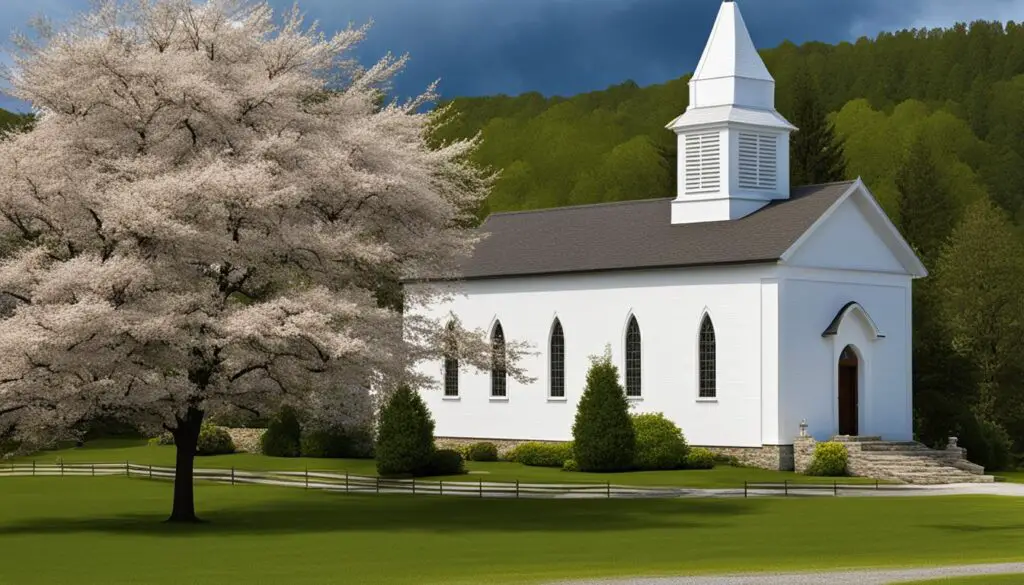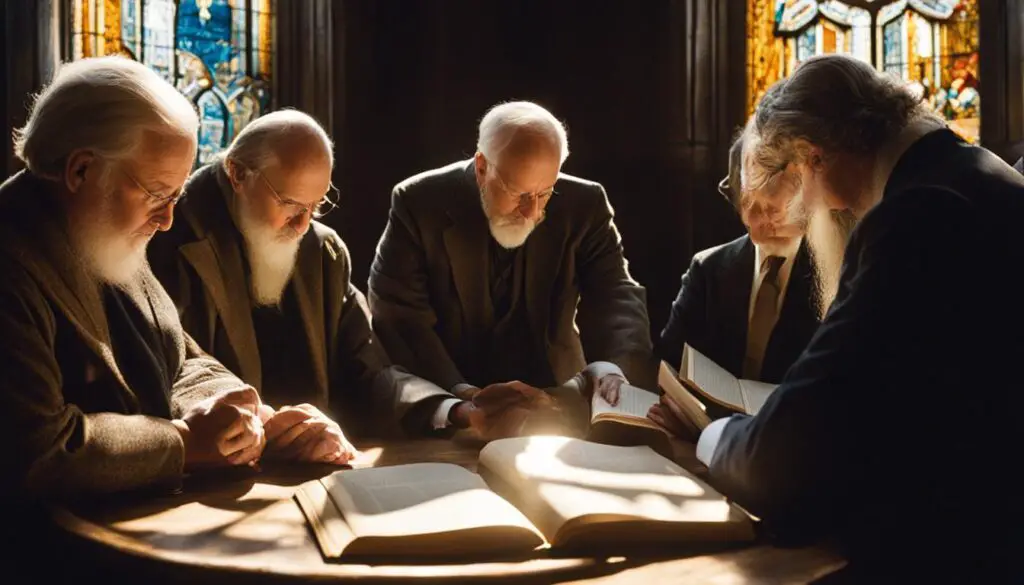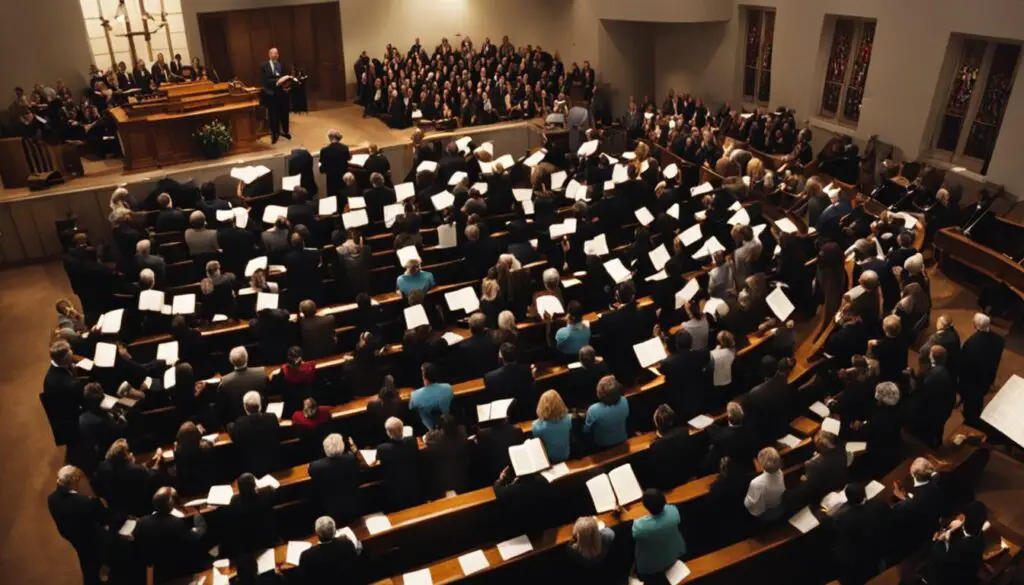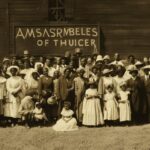The Baptist Church has a rich and fascinating history that dates back centuries. It emerged as a distinct Christian denomination in the early 17th century and has since grown into a global movement with millions of adherents.
The roots of the Baptist Church can be traced to Amsterdam in 1609, where English Separatist John Smyth founded the first Baptist congregation. From there, the movement spread to England, where it branched into two groups: the General Baptists and the Particular Baptists. Over time, the Baptist faith gained traction and established a strong presence worldwide.
What sets the Baptist Church apart is its emphasis on certain key aspects of the Christian faith. Baptists believe in believer’s baptism, which means that individuals are baptized only after professing their faith in Jesus Christ. They also uphold the principles of soul competency, affirming that each person is responsible for their own relationship with God, and congregationalist church government, where each church is autonomous in decision-making.
Today, the Baptist Church is a diverse and vibrant community, united by their shared beliefs and commitment to serving God and their communities.
Key Takeaways:
- The Baptist Church originated in Amsterdam in 1609 with John Smyth as its pastor.
- The movement spread to England, giving rise to the General Baptists and Particular Baptists.
- Baptists emphasize believer’s baptism, soul competency, and congregationalist church government.
- The largest group of Baptist churches is the Baptist World Alliance.
- The Baptist Church has a rich history and continues to impact communities worldwide.
Origins of the Baptist Church
The Baptist Church has its roots in the 17th-century English Separatist movement, which sought to reform the Church of England. The movement gained momentum when John Smyth, an English Separatist, established the first Baptist congregation in Amsterdam in 1609.
From there, the Baptist faith spread to England, where it took shape and evolved into two main branches known as the General Baptists and the Particular Baptists. These branches differed in their beliefs and practices, but both shared a commitment to Baptist principles.
The Baptist Church is characterized by its fundamental beliefs and practices, which include believer’s baptism, soul competency, and congregationalist church government. These core beliefs set Baptists apart from other Christian denominations and define their unique identity.
Believer’s baptism is a key tenet of the Baptist faith. Unlike infant baptism, which is practiced by some other Christian traditions, Baptists believe that baptism should be reserved for individuals who can profess their faith and make a personal commitment to Christ. This symbolic act signifies the believer’s identification with Jesus’ death, burial, and resurrection.
Soul competency is another central belief of the Baptist Church. It emphasizes the autonomy and individual responsibility of each believer in matters of faith and salvation. According to this belief, every person has the capacity to establish a direct relationship with God and interpret the Scriptures for themselves.
Congregationalist church government is the organizational structure adopted by most Baptist churches. It means that each local church has autonomy and makes decisions independently, guided by the principles of democracy and shared leadership.

“Baptist beliefs are rooted in the principles of believer’s baptism, soul competency, and congregationalist church government. These foundational doctrines define the Baptist Church and its rich history.”
Baptist Denominations and Diversity
While the Baptist Church shares these core beliefs, it is important to note that there is diversity within the Baptist community. Different Baptist denominations and congregations may have varying interpretations of these beliefs and specific practices.
Some denominations, such as the Southern Baptist Convention or the American Baptist Churches USA, are larger and more centralized, while others operate as independent churches without formal affiliations.
Despite these differences, the Baptist Church remains united by its commitment to Baptist beliefs and its mission to spread the message of Christ’s love and salvation to the world.
Beliefs and Doctrines of the Baptist Church
The Baptist Church holds strong beliefs and doctrines that guide their faith and practices. These beliefs are centered around the principles of believer’s baptism, salvation by faith alone (sola fide), and the authority of the Bible (sola scriptura).
“We believe that baptism is an important step in the life of a believer, symbolizing their commitment to follow Jesus Christ. It is a public declaration of their faith and a spiritual act of obedience.”
The concept of believer’s baptism is a key tenet of the Baptist faith. This means that individuals are baptized only after they have confessed their personal faith in Jesus Christ. Baptism is seen as an outward expression of an individual’s inward commitment to follow Jesus, marking their identification with Christ’s death, burial, and resurrection.
Sola fide, meaning “faith alone,” is another important doctrine in the Baptist Church. Baptists believe that salvation is a gift from God and cannot be earned through good works or religious rituals. It is through faith in Jesus Christ and His atoning sacrifice that believers are justified and receive eternal life.
Sola scriptura, or “scripture alone,” underscores the Baptist belief in the Bible as the ultimate authority in matters of faith and practice. Baptists rely on the Bible as their primary source of guidance, considering it inspired and without error. They believe that the Word of God provides the necessary insight for doctrine, worship, and Christian living.
These beliefs and doctrines serve as the foundation of the Baptist faith, shaping their understanding of salvation, baptism, and the role of scripture in their spiritual journey.

Baptist Beliefs and Doctrines:
- Believer’s baptism
- Salvation by faith alone (sola fide)
- Authority of the Bible (sola scriptura)
Sacraments and Rituals of the Baptist Church
The Baptist Church recognizes two ordinances: baptism and communion. These sacraments hold great significance in the life of a Baptist believer, representing important milestones and spiritual practices.
Baptism
Baptism is considered an outward expression of an individual’s faith and commitment to Jesus Christ. It is a powerful symbol of spiritual rebirth and initiation into the community of believers. Baptists practice baptism through full immersion in water, which symbolizes the believer’s identification with Christ’s death, burial, and resurrection. This act of immersion represents the cleansing of sins and the believer’s new life in Christ.
Communion
Communion, also known as the Lord’s Supper, is a sacred ritual that commemorates Jesus’ death and resurrection. It is a time of reflection, remembrance, and spiritual nourishment. During communion, believers partake in the symbols of bread and wine (or grape juice), which represent the body and blood of Jesus Christ. By participating in communion, believers reaffirm their faith in Christ’s sacrifice and the forgiveness of sins.
In Baptist churches, communion is usually observed regularly, such as monthly or quarterly, and is conducted with reverence and solemnity. Believers come together as a community of faith, sharing in this meaningful and significant practice.
Leadership and Clergy in the Baptist Church
The Baptist Church operates under a decentralized leadership structure, with each congregation enjoying autonomy in decision-making. At the helm of individual churches, you will find pastors or ministers who provide spiritual guidance and support. These leaders play a pivotal role in guiding the Baptist community on their spiritual journey, fostering a sense of unity, and facilitating meaningful connections with God and fellow believers.
Within the Baptist Church, there can also be additional roles that support the congregation’s overall ministry. Deacons or elders often assist pastors in carrying out various responsibilities, such as overseeing the spiritual and practical needs of the church, providing pastoral care, and promoting a sense of community among members.
The Baptist Church recognizes the importance of strong and effective leadership in guiding believers and shaping the future of the community. Baptist leaders strive to inspire, educate, and empower their congregation, fostering an environment in which individuals can grow in their faith, develop their spiritual gifts, and contribute to the well-being of the community.
The Role of Women in Baptist Leadership
“In Christ, there is neither Jew nor Greek, slave nor free, male nor female” – Galatians 3:28
The role of women in Baptist leadership varies among different denominations. While some Baptist churches fully embrace the leadership of women in ministry, others maintain more traditional views that restrict certain roles to men. Over time, however, many Baptist denominations have recognized the important contributions women can make to the church and have expanded opportunities for women to serve in leadership positions.
Denominations that affirm the value of women’s leadership may have female pastors, ministers, deacons, and elders. These women provide invaluable insights, spiritual guidance, and pastoral care to their congregations, enriching the diversity and inclusive nature of the Baptist ministry.
Regardless of their gender, Baptist leaders are dedicated to leading with integrity, compassion, and a deep commitment to their faith, guiding their congregations on a transformative spiritual journey.

Worship Practices in the Baptist Church
In the Baptist Church, worship practices are diverse, reflecting the congregational autonomy and the importance placed on individual believers’ active participation. Baptist worship services typically consist of congregational singing, prayer, preaching, and the observance of baptism and communion, which hold significant spiritual and symbolic value.

Congregational singing occupies a central role in Baptist worship. It serves as a unifying force, allowing the faithful to express their devotion and actively participate in worship. Hymns and spiritual songs, accompanied by musical instruments or acapella, uplift the congregation’s spirits and create an atmosphere of reverence and celebration.
Prayer is another integral part of Baptist worship services. It serves as a means of communication with God, allowing individuals to express their gratitude, seek guidance, and intercede for others. Prayers may be led by the pastor, worship leader, or members of the congregation, fostering a sense of community and shared spiritual responsibility.
“Prayer is where the action is.” – John Baptist Rosenthal
Preaching holds a significant place in Baptist worship. The sermon, delivered by the pastor or guest speakers, aims to teach, inspire, and challenge the congregation through the interpretation and application of biblical teachings. Sermons often emphasize personal faith, spiritual growth, and the practical relevance of scripture in daily life.
Baptism and Communion
Baptism and communion are two sacraments observed in the Baptist Church. Baptism is considered an important step in the believer’s faith journey and serves as a public declaration of their commitment to Jesus Christ. It is typically performed through full immersion in water, symbolizing purification, spiritual rebirth, and identification with Christ’s death, burial, and resurrection.
Communion, also known as the Lord’s Supper or the Eucharist, is a symbolic representation of Jesus’ Last Supper with his disciples. During communion, bread and wine (or grape juice) are shared among the congregation, representing the body and blood of Christ. It serves as a solemn remembrance of Jesus’ sacrifice and a reaffirmation of the believer’s commitment to follow his teachings.
Worship practices in the Baptist Church encourage the active involvement of all believers, emphasizing the priesthood of all believers. This inclusive approach fosters a sense of community, spiritual growth, and shared responsibility within the congregation, allowing individuals to connect with God, express their devotion, and experience the transformative power of worship.
Sacred Texts of the Baptist Church
The Baptist Church holds the Bible as its sacred text, viewing it as the inspired word of God. The scriptures play a central role in shaping Baptist beliefs, practices, and teachings.
Within the Baptist Church, various translations of the Bible are utilized, with common versions including the King James Version (KJV), the New International Version (NIV), and the English Standard Version (ESV). These translations aim to make the scripture accessible and understandable to believers of different backgrounds and preferences.
Biblical Authority and Interpretation
The Baptist faith upholds the principle of sola scriptura, which asserts that the Bible is the ultimate and sole authority in matters of faith and practice. This means that the Bible serves as the foundation for Baptist beliefs, guiding their understanding of God’s will and the Christian way of life.
Baptists interpret the scriptures through the lens of personal faith, with an emphasis on individual spiritual discernment. While the Baptist Church values theological scholarship and biblical study, each believer is encouraged to approach the scriptures independently, seeking guidance from the Holy Spirit in their interpretation.
Inspiration and Reliability
Baptists believe that the Bible is divinely inspired, with its authors being guided by the Holy Spirit. They affirm that the scriptures are free from error and provide trustworthy guidance for matters of faith and morality.
The Baptist Church recognizes the Bible as a collection of sacred texts divided into the Old and New Testaments. The Old Testament contains the sacred writings of Judaism, including the Torah, Prophets, and Writings. The New Testament comprises the teachings of Jesus Christ, the early Christian church, and apostolic letters.

Baptists value personal study of the scriptures and encourage believers to engage in regular Bible reading, reflection, and meditation. The Bible serves as a source of guidance, inspiration, and instruction for faithful living.
“The Bible is the compass that points us in the right direction and the map that guides our steps on the Christian journey.” – Dr. Martin Luther King Jr.
The profound influence of the Bible on Baptist theology and practice is evident in their commitment to biblical teachings and the importance placed on scripture in worship services, preaching, and personal devotion.
Denominations and Sects within the Baptist Church
The Baptist Church is a diverse religious denomination that encompasses various denominations and sects, each with its own unique beliefs, practices, and organizational structures. These distinct groups within the Baptist faith make it a vibrant and dynamic religious movement.
Notable Baptist denominations include:
- The Southern Baptist Convention: As the largest Baptist denomination in the United States, the Southern Baptist Convention emphasizes evangelism, biblical authority, and conservative theology.
- The American Baptist Churches USA: This denomination is known for its progressive stances on social issues and its commitment to social justice and inclusivity.
- The National Baptist Convention: The largest African American Baptist denomination in the United States, it plays a crucial role in advocating for civil rights and promoting the welfare of the African American community.
In addition to these denominations, there are also independent Baptist churches that do not align with any particular denomination but maintain their autonomy in belief and practice. These independent churches often prioritize local governance and may have distinct theological perspectives.
“In the diversity of denominations and sects within the Baptist Church, there is unity in our shared commitment to faith, worship, and serving others.”
Community and Outreach in the Baptist Church
The Baptist Church places utmost importance on fostering a strong and vibrant community while actively engaging in outreach efforts. Through their deep-rooted commitment to spreading the message of love, compassion, and faith, Baptist communities strive to make a positive difference in the world.
Driven by their belief in serving others and following the teachings of Jesus Christ, Baptist churches actively participate in various community service initiatives. They dedicate their time, resources, and skills to uplift the underprivileged, provide relief during times of crisis, and support the marginalized.
One of the key ways in which the Baptist community extends their outreach is through mission trips. These trips enable members to venture beyond their localities and reach out to distant communities, both within the United States and globally. Working closely with partners and organizations, Baptist mission teams bring hope, healing, and the message of salvation to those in need.
“We serve because we are called to imitate Christ’s love in action. Through community service, mission trips, and evangelism, we strive to touch lives, inspire hope, and share the transformative power of God’s love.” – Rev. James Mitchell
Baptist churches actively champion social justice causes, advocating for racial equality, human rights, and the eradication of injustice. By raising awareness and initiating transformative conversations, they seek to build a more inclusive and equitable society. Through their actions, Baptist communities inspire individuals to stand up against discrimination and work towards a better future for all.
Baptist outreach extends beyond physical assistance. They provide emotional and spiritual support through counseling, prayer, and pastoral care to individuals grappling with personal challenges. Baptist churches strive to walk alongside those in need, offering encouragement, solace, and guidance during difficult times.
The Baptist Community: A Beacon of Hope
Within the Baptist community, the spirit of unity and fellowship thrives. Congregants come together for worship, learning, and mutual support. The church becomes a sanctuary where individuals can find acceptance, belonging, and spiritual nourishment.
Through shared experiences, fellowship events, and small group gatherings, the Baptist community creates an environment where members can forge deep connections, develop lasting friendships, and build a strong support system. This sense of community is truly invaluable, providing strength and encouragement in times of joy and adversity.
Moreover, the Baptist community values inclusivity and welcomes individuals from diverse backgrounds, fostering an atmosphere where everyone is embraced and celebrated. Regardless of age, race, ethnicity, or social status, all are invited to experience the warmth and love that permeates Baptist churches.
Embodying the teachings of Jesus Christ, the Baptist community extends open arms to newcomers, engaging them in meaningful conversations, and providing guidance on their spiritual journey. Through mentorship programs and fellowship opportunities, they ensure that individuals feel supported and empowered as they navigate their faith.
As the Baptist community continues to grow and evolve, their commitment to community and outreach remains steadfast. With fervor and passion, they strive to make a lasting impact, both within their congregations and in the wider world.
Architectural and Artistic Features of Baptist Churches
Baptist church buildings showcase a variety of architectural styles, ranging from traditional designs that exude historical charm, to more modern and contemporary structures that embody innovation and creativity. These architectural choices reflect the diverse nature of the Baptist Church, as well as the changing preferences and needs of its members.
Many Baptist churches prioritize a simple and functional design, emphasizing a warm and welcoming atmosphere for worship and community gatherings. This focus on practicality allows for a versatile space that can accommodate different activities and events while fostering a sense of unity and togetherness among congregants.
One notable architectural feature found in Baptist churches is the use of stained glass windows. These vibrant and awe-inspiring pieces of art serve as a visual representation of important biblical narratives and religious symbols. Through the interplay of light and color, stained glass windows create an atmosphere conducive to reflection, reverence, and spiritual contemplation.
Religious paintings and sculptures are also prevalent in Baptist churches. These artistic expressions can be found adorning the walls or as standalone pieces within the church interior. They serve as visual representations of biblical figures, events, and religious themes, inspiring a deeper connection to the faith and its teachings.
Ultimately, the architectural and artistic features of Baptist churches contribute to the overall ambiance and spiritual experience within these sacred spaces. By combining functionality and aesthetics, Baptist churches create an environment that invites worshippers to connect with their faith, immerse themselves in prayer, and experience a profound sense of spiritual fulfillment.
Baptist Church Architectural and Artistic Features
| Features | Description |
|---|---|
| Architectural Styles | Baptist churches exhibit a range of architectural styles, from traditional to modern designs. |
| Simple and Functional Design | Emphasizing a welcoming space for worship and community gatherings. |
| Stained Glass Windows | Vibrant and symbolic windows portraying biblical narratives and religious themes. |
| Religious Paintings and Sculptures | Artistic expressions that depict biblical figures, events, and religious symbols. |
Contemporary Issues and Challenges in the Baptist Church
The Baptist Church, like any religious institution, faces a range of contemporary issues and challenges. These challenges stem from the ever-changing social landscape and the need for the church to adapt and respond to the needs of its members and society as a whole.
One of the main contemporary issues in the Baptist Church is the ongoing debate surrounding LGBTQ+ rights. As attitudes towards gender and sexuality continue to evolve, different Baptist denominations and congregations grapple with how to approach and engage with the LGBTQ+ community. This includes questions about same-sex marriage, LGBTQ+ individuals in church leadership roles, and the acceptance and inclusion of LGBTQ+ individuals within the church community.
Another significant issue is the ongoing conversation regarding women’s ordination. While some Baptist denominations have embraced the ordination of women, others maintain a more traditional stance, only allowing men to serve in leadership roles. This issue often sparks debate and calls for a reexamination of traditional beliefs and interpretations of scripture within the Baptist Church.
Environmental stewardship is another contemporary challenge faced by the Baptist Church. With the growing importance of sustainability and conservation efforts, many Baptist congregations are grappling with how to incorporate these values into their teachings and practices. This includes addressing climate change, adopting eco-friendly practices, and promoting responsible stewardship of the Earth.
Lastly, the role of the church in society is a recurring issue. As societal structures and norms change, Baptist congregations are faced with the challenge of finding their place in an increasingly secular world. This includes navigating topics such as political involvement, social justice, and creating a welcoming and inclusive environment for all individuals regardless of their backgrounds.
FAQ
What is the history of the Baptist Church?
The Baptist Church originated in Amsterdam in 1609 with English Separatist John Smyth as its pastor. It spread to England where the General Baptists and Particular Baptists emerged. The Baptist faith emphasizes believer’s baptism, soul competency, and congregationalist church government. The largest group of Baptist churches is the Baptist World Alliance.
What are the beliefs and doctrines of the Baptist Church?
The Baptist Church believes in believer’s baptism, soul competency, sola fide (salvation by faith alone), and sola scriptura (scripture alone as the rule of faith and practice). The movement has diverse beliefs and practices among its denominations and congregations.
What are the sacraments and rituals of the Baptist Church?
The Baptist Church recognizes two ordinances: baptism and communion. Baptism is considered an outward expression of an individual’s faith and is usually done through full immersion. Communion, also known as the Lord’s Supper, is a symbolic remembrance of Jesus’ death and resurrection.
How is leadership structured in the Baptist Church?
The Baptist Church typically has a decentralized leadership structure with each congregation being autonomous. They have pastors or ministers who lead the individual churches and may be supported by deacons or elders. The role of women in leadership varies among different Baptist denominations.
What are the worship practices in the Baptist Church?
Worship practices in the Baptist Church can vary, but they often include congregational singing, prayer, preaching, and the observance of baptism and communion. Baptists value the active participation of all believers in worship and emphasize the priesthood of all believers.
What is the sacred text of the Baptist Church?
The sacred text of the Baptist Church is the Bible, which is seen as the inspired word of God. Baptists generally use various translations of the Bible, such as the King James Version or the New International Version, in their worship services and personal study.
What denominations and sects exist within the Baptist Church?
The Baptist Church consists of various denominations and sects, each with its own distinct beliefs, practices, and organizational structures. Some notable Baptist denominations include the Southern Baptist Convention, American Baptist Churches USA, and the National Baptist Convention. There are also independent Baptist churches that do not align with any particular denomination.
How does the Baptist Church engage in community and outreach?
The Baptist Church places importance on community and outreach. They often engage in community service, mission trips, and evangelism to share their faith and help those in need. Baptist churches also support various social justice causes and may be involved in advocacy for issues such as racial equality and human rights.
What are the architectural and artistic features of Baptist churches?
Baptist church buildings can vary in architectural style, ranging from traditional to modern designs. Many Baptist churches have a simple and functional design, focusing on creating a welcoming space for worship and community gatherings. The artistic features within Baptist churches may include stained glass windows, religious paintings, and sculptures.
What are some contemporary issues and challenges faced by the Baptist Church?
The Baptist Church, like any religious institution, faces a range of contemporary issues and challenges. These may include debates on topics such as LGBTQ+ rights, women’s ordination, environmental stewardship, and the role of the church in society. Different Baptist denominations and congregations may have varying perspectives on these issues.
















